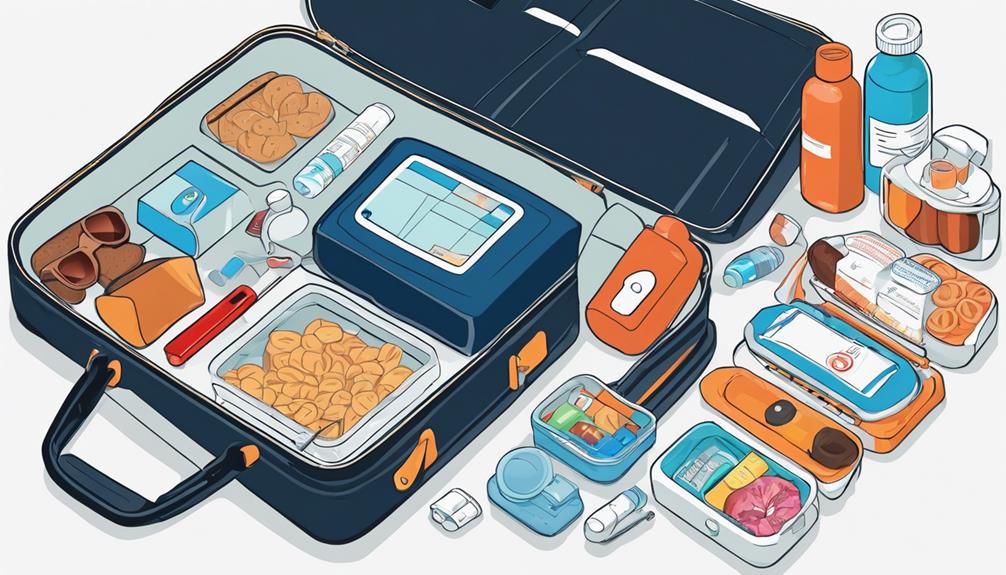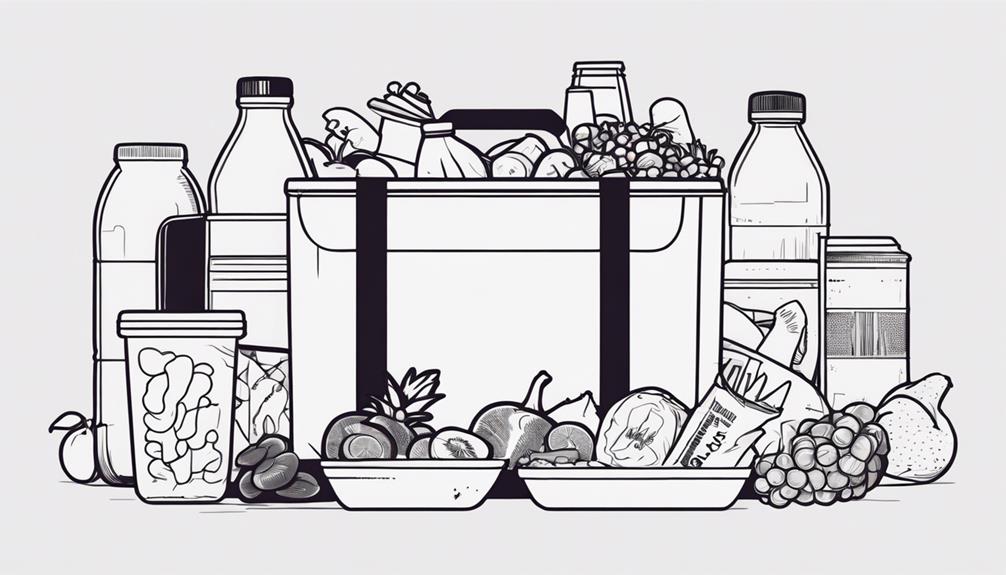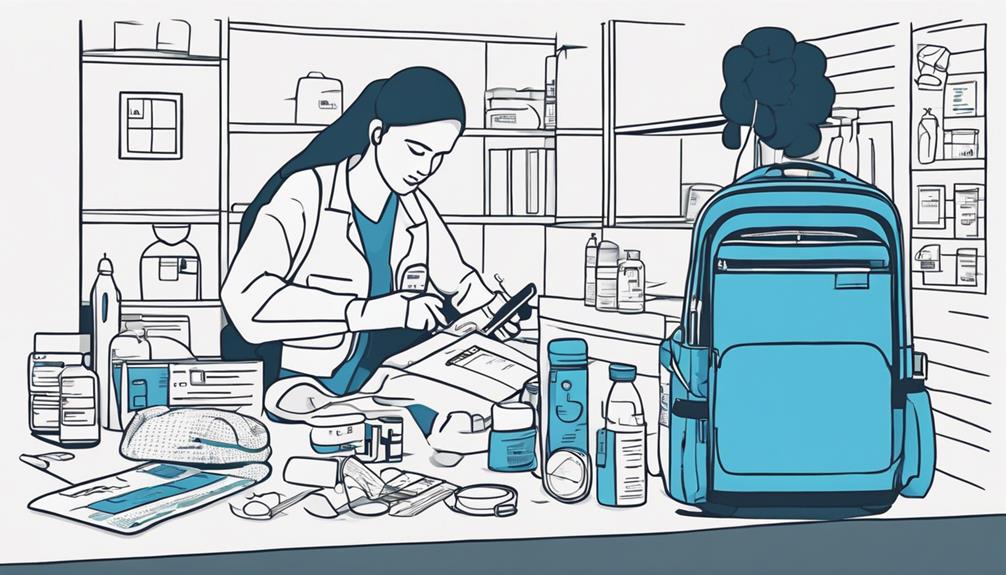Are you a diabetic individual planning your next trip? Navigating travel with diabetes can present unique challenges, but fear not, as we have compiled three essential tips to help you maintain control of your health while on the move.
From packing necessities to managing medications abroad, these strategies will ensure a smoother journey.
Stay tuned to discover how you can make your travels worry-free and enjoyable, no matter where your adventures take you.
Key Takeaways
- Pack emergency diabetic supplies for quick access.
- Plan insulin dosages for different time zones.
- Maintain stable blood sugar levels while traveling.
- Prepare healthy snacks and meals on the go.
Packing Essentials for Diabetic Travel

When preparing for diabetic travel, ensure you pack all essential supplies, medications, and documentation to manage your condition effectively while away from home. It's crucial to have a variety of snack options readily available to help regulate your blood sugar levels throughout your journey. Pack snacks like nuts, seeds, whole fruits, or whole-grain crackers to prevent sudden drops or spikes in blood sugar.
Additionally, don't forget your blood sugar monitoring devices. Bring extra test strips, lancets, and a glucose meter to keep track of your levels regularly. Having these tools on hand will allow you to make informed decisions about your diet, medication, and activities while traveling. Remember, maintaining stable blood sugar is essential for your well-being.
Managing Insulin and Medications Abroad
To effectively manage your insulin and medications while traveling abroad, prioritize proper planning and organization to ensure uninterrupted access to essential supplies. When dealing with language barriers and cultural differences, navigating healthcare systems in foreign countries can be challenging. Here are some key strategies to help you manage your insulin and medications abroad:
- Carry a translated list: Have a detailed list of your medications and dosages translated into the local language to facilitate communication with healthcare providers.
- Research local pharmacies: Identify pharmacies at your travel destination where you can purchase emergency supplies or refill prescriptions if needed.
- Carry extra supplies: Always pack more insulin and medications than you anticipate needing to account for unexpected delays or loss.
Being proactive and prepared will give you peace of mind and ensure that you can manage your diabetes effectively while exploring new destinations.
Planning Healthy Meals on the Go

For optimal health maintenance during your travels, strategizing your meal planning while on the go is essential. When it comes to snack options, aim for a balance of carbohydrates, proteins, and healthy fats. Pack nuts, seeds, or whole fruits for quick, nutritious bites that help stabilize blood sugar levels. Opt for pre-portioned snacks to ensure you're not overindulging.
Practice portion control by using smaller containers or bags to divide larger snacks into appropriate servings. This way, you can enjoy your favorite treats without worrying about consuming too much at once.
When dining out, look for restaurants that offer customizable options or small plates to manage portion sizes effectively. Don't hesitate to ask for modifications like steamed vegetables instead of fries or sauces on the side to control added sugars and fats. Remember, flexibility is key, so plan ahead, but also be prepared to adapt to different meal situations while traveling.
Coping With Time Zone Changes
Navigating time zone changes can significantly impact your daily routine and insulin management as a diabetic traveler. When coping with these shifts, it's essential to prioritize your health and well-being.
Here are some tips to help you manage time zone changes effectively:
- Maintain a Consistent Sleep Schedule: Try to stick to a regular sleep pattern even when traveling to different time zones. This consistency can help regulate your body's internal clock and improve insulin sensitivity.
- Stay Hydrated: Dehydration can exacerbate the effects of jet lag and disrupt your blood sugar levels. Be sure to drink plenty of water throughout your journey to stay hydrated and maintain proper hydration levels.
- Gradually Adjust Your Insulin Schedule: If you need to adjust your insulin dosages due to time zone changes, do so gradually. Consult with your healthcare provider to create a plan that ensures a smooth transition without sudden spikes or drops in blood sugar levels.
Emergency Preparedness for Diabetic Travel

As a diabetic traveler, being prepared for emergencies is crucial to ensuring your health and safety while on the go. When traveling, always carry a first aid kit tailored to your diabetic needs. Include items such as glucose tablets or gel, insulin, syringes, and medication for related conditions. It's essential to have quick access to your supplies in case of unexpected situations like low blood sugar or other diabetic emergencies.
Additionally, make sure to have a list of emergency contacts readily available. Include contact information for your healthcare provider, emergency services in the area you're visiting, and a family member or friend who knows about your condition. This will ensure that you can quickly reach out for help if needed.
Frequently Asked Questions
How Can Diabetic Individuals Ensure They Have Access to Medical Care While Traveling?
To ensure you have access to medical care while traveling, managing your medication and emergency supplies is crucial. Carry extra medications, know where local pharmacies are, and always have your doctor's contact information on hand.
Are There Specific Travel Insurance Options Available for Diabetic Individuals?
When it comes to insurance coverage for diabetic travelers, it's crucial to research options that cater to your needs. Emergency preparations are essential, so ensure your policy includes coverage for medical emergencies related to your condition.
What Should Diabetic Individuals Do in Case of a Medical Emergency While Traveling?
In case of a medical emergency while traveling, ensure you carry emergency contacts and wear a medical alert bracelet. This can provide vital information to medical professionals quickly, ensuring you receive appropriate care in a timely manner.
How Can Diabetic Individuals Communicate Their Condition to Others While Traveling?
Hey, you savvy traveler! When on the go, ensure your safety by carrying emergency snacks for those blood sugar dips. Flaunt your medical ID – a silent superhero cape that speaks volumes.
Are There Any Specific Travel Restrictions for Diabetic Individuals to Be Aware Of?
When traveling with diabetes, be mindful of specific dietary restrictions and medication storage guidelines. It's crucial to plan ahead, pack extra supplies, and inform airline staff if needed. Stay proactive to ensure a smooth and enjoyable journey.
Conclusion
In conclusion, traveling with diabetes requires careful planning and preparation to ensure a safe and enjoyable trip. Did you know that approximately 422 million people worldwide have diabetes?
By following these essential travel tips, you can manage your condition effectively while exploring new destinations. Remember to pack your essentials, plan your meals, and stay on top of your medication schedule to make the most of your adventures without compromising your health.
Safe travels!